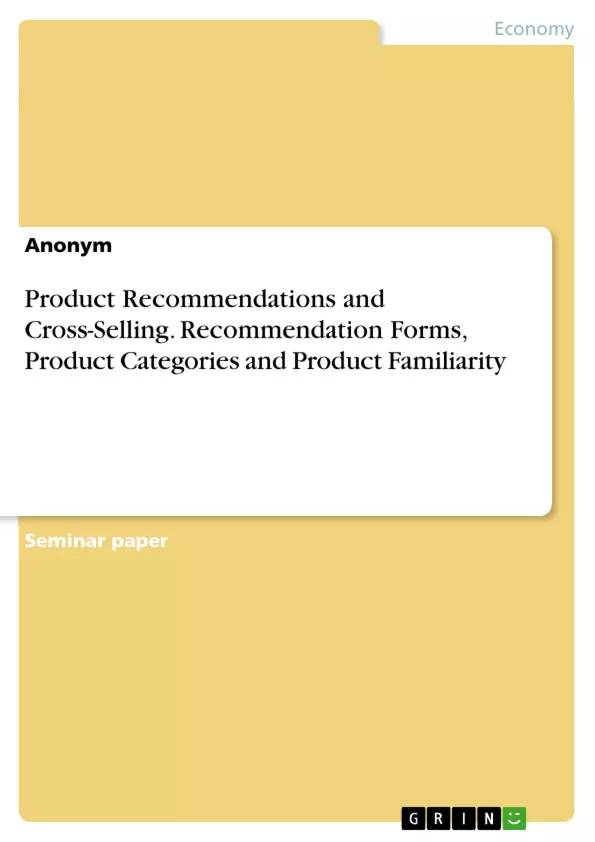In this study, we aim to investigate how two different types of online recommender systems affect the cross-selling of a retailer on a website using the online recommender systems. Furthermore, this will give us the chance to study the direct effect of targeting on cross-selling. Different from the previous studies, this study will mainly focus on two aspects.
On the one hand, the online recommender systems will be divided into two types, the targeting recommender systems, and popular recommender systems. The first one is the personalized form through which we can give the targeted consumers the specific products recommenders based on the consumers’ purchase history. This type has been fully discussed in previous studies. The second type of a recommender system is the public form giving the recommendations based on the hot products, which is a common phenomenon in e-commerce platforms. In other words, recommended products or services come from common preferences of all consumers. Research on the relationship between cross-selling and this type of recommender system is still relatively lacking.
On the other hand, we will discuss the different moderating effects between two different types of the recommended products — search-type and experience-type products — as well as the influence caused by product familiarity on the relationship between the online recommender systems and cross-selling. These two types of products have been fully discussed in the area about the helpfulness of online reviews. In addition, familiar and unfamiliar products differ in terms of the knowledge regarding the products that a consumer has stored in memory. This will affect how consumers search and process the online recommender systems and co-purchase information. Therefore, we will consider these in the process of data collecting.
Through examining those previously described causal effects, we can make the following two contributions. Firstly, we can make further suggestions about how the choice for an online recommender system can influence cross-selling and thereby further contribute to the discussion about recommender systems in the e-commerce ecosystem. Secondly, we can classify the cross-influence from the product types and product familiarity in the above-stated relationship between online recommender systems and cross-selling.
Inhaltsverzeichnis (Table of Contents)
- Introduction
- Literature Review
- Cross-Selling
- Recommender Systems
- Product categories and product familiarity
- Hypothesis
- Research Model and Hypothesis Development
- The effect between different types of recommender systems and cross-selling
- The moderation effect of product categories and product familiarity
- Research Method
- Experimental Design
- Experimental Task and Procedures
- Measurement of Dependent Variable
- References
Zielsetzung und Themenschwerpunkte (Objectives and Key Themes)
This study aims to investigate the impact of different online recommender systems on cross-selling within an e-commerce context. By comparing targeting and popular recommender systems, the research aims to understand the direct effect of targeting on cross-selling. It also explores the moderating effects of product categories (search-type and experience-type) and product familiarity on the relationship between recommender systems and cross-selling.
- The impact of different online recommender systems on cross-selling.
- The direct effect of targeting on cross-selling.
- The moderating effect of product categories (search-type and experience-type) on cross-selling.
- The influence of product familiarity on the relationship between recommender systems and cross-selling.
- Contributions to the discussion about recommender systems in the e-commerce ecosystem.
Zusammenfassung der Kapitel (Chapter Summaries)
- Introduction: The chapter sets the context of the study, highlighting the increasing competition in e-commerce and the role of online recommender systems in guiding customers through the overwhelming number of product options. It introduces the benefits of recommender systems, such as reduced search costs and enhanced cross-selling opportunities, and outlines the two main types of recommender systems investigated: targeting and popular recommender systems.
- Literature Review: This chapter reviews the relevant literature on cross-selling, recommender systems, and the impact of product categories and product familiarity on purchasing decisions. It provides a foundation for the study's theoretical framework and hypothesis development.
- Hypothesis: This chapter presents the research model and develops the hypotheses based on the literature review. It outlines the expected relationships between different types of recommender systems, product categories, product familiarity, and cross-selling behavior.
- Research Method: This chapter describes the experimental design, task procedures, and measurement of the dependent variable used to test the hypotheses. It details the methodology employed to collect and analyze data in the study.
Schlüsselwörter (Keywords)
Key terms and concepts explored in this research include: online recommender systems, cross-selling, targeting, popular recommender systems, product categories (search-type, experience-type), product familiarity, e-commerce, and consumer behavior.
Frequently Asked Questions
What is the main goal of this study on recommender systems?
The study investigates how different types of online recommender systems (targeting vs. popular) affect cross-selling and how product categories and familiarity moderate this relationship.
What is the difference between targeting and popular recommender systems?
Targeting systems are personalized based on an individual's purchase history, while popular systems recommend "hot products" based on the common preferences of all consumers.
How do search-type and experience-type products differ in this context?
The research explores how the type of product—whether its quality can be evaluated before purchase (search) or only after use (experience)—affects the success of a recommendation.
What role does product familiarity play in consumer decision-making?
Product familiarity affects how consumers process recommendations; those with more knowledge in their memory search for and evaluate co-purchase information differently than unfamiliar consumers.
How can retailers benefit from the findings of this research?
Retailers can gain suggestions on which type of recommender system to choose for specific product types to maximize cross-selling and improve the e-commerce ecosystem.
- Quote paper
- Anonym (Author), 2018, Product Recommendations and Cross-Selling. Recommendation Forms, Product Categories and Product Familiarity, Munich, GRIN Verlag, https://www.grin.com/document/469311



